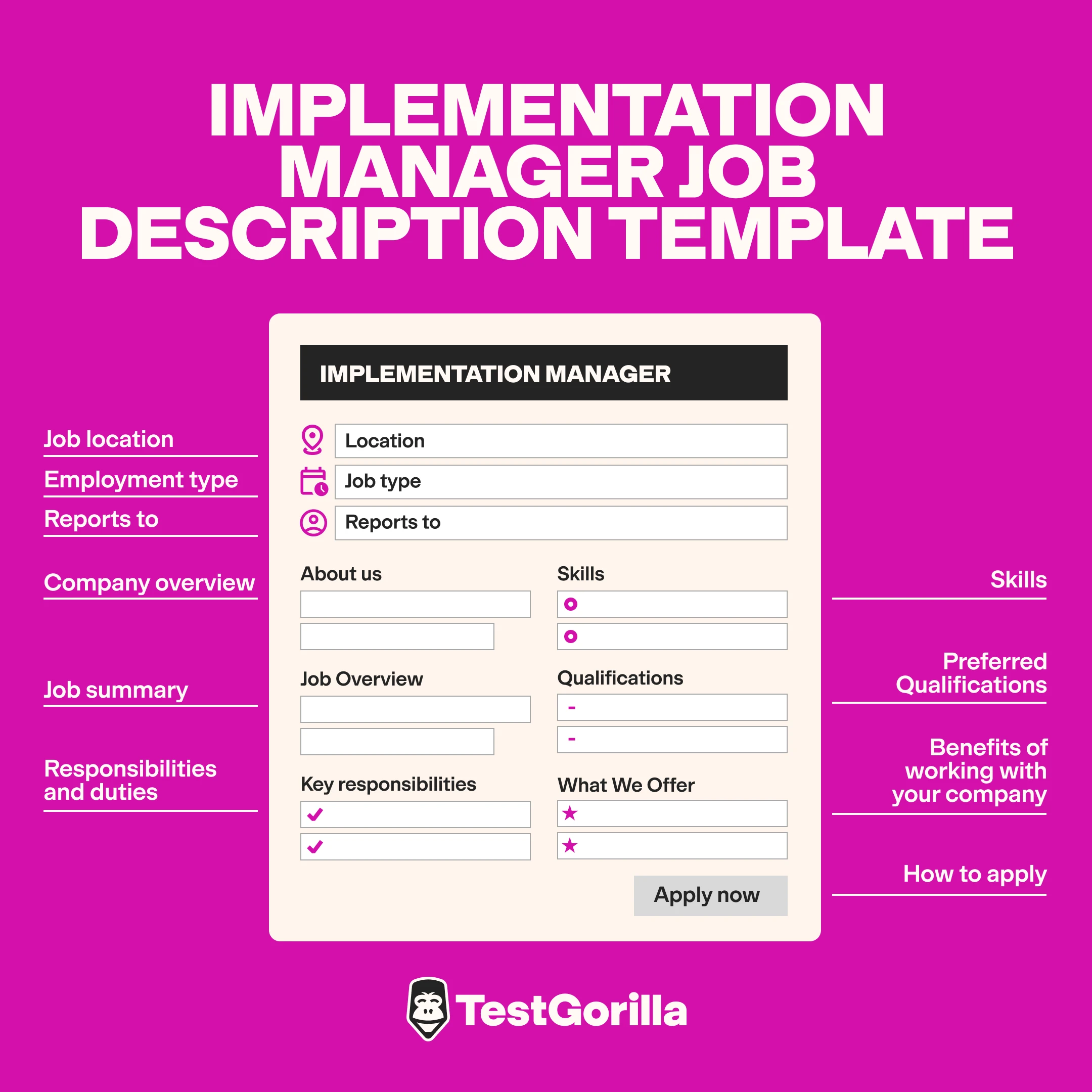Implementation manager job description template: Everything you need to include
Implementation managers are responsible for getting a project or system up and running. They bring teams together, manage timelines, and solve problems during the process.
Writing a clear job description for this role can be tough because your ideal candidate needs so many skills for implementing a new process – from technical skills to project management to teamwork. How can your job description detail everything you need without overwhelming and deterring potential applicants?
Don't worry – we’ve got you covered with a template that includes all the essentials. Plus, we guide you through a skills-based hiring approach to find an implementation manager who fits your team perfectly.
Table of contents
Implementation manager job description template
The focus of your job description will depend on what your implementation manager will do: Will they work for your internal teams – implementing new technologies or spearheading initiatives, for instance? Or will they work for your clients – overseeing the deployment of your products and/or services and ensuring client satisfaction?
Our template covers both scenarios – so you can customize it to suit your needs.
Job Title: Implementation Manager
Location: [Insert Location]
Reports To: Director of Operations / Implementation Director
Job Type: [Full-time/Part-time/Contract]
About Us
At [Company Name], we specialize in [briefly describe what the company does]. Our core values of [list core values] inspire us to [deliver outstanding solutions to our clients / enhance our internal processes and efficiency]. We are proud of our collaborative culture, which empowers employees to contribute to our growth and make a meaningful impact.
Role Overview
We are seeking a proactive and experienced Implementation Manager to join our team. In this role, you will be responsible for overseeing the deployment of our [products / services / internal initiatives], ensuring a smooth and successful implementation process. This role will be key in leading [projects aimed at our clients, ensuring their needs and expectations are met / internal initiatives that drive change and optimize our operational workflows].
Key Duties and Responsibilities
Lead the end-to-end implementation process, including planning, scheduling, and coordinating all phases of deployment.
Serve as the primary point of contact for [clients / team members] during the implementation process, ensuring their needs are understood and addressed.
Collaborate with departments such as [sales, product development, and customer support / HR, IT, and finance] to ensure successful project execution and seamless integration.
Manage project timelines, resources, and deliverables, ensuring [client expectations are met and exceeded / internal project goals are achieved efficiently].
Identify potential risks and develop mitigation strategies.
Provide training and support to [clients / team members], ensuring they’re well-equipped to [use our products or services / adopt new initiatives] effectively.
Create and maintain detailed project documentation, including project plans, status reports, and post-implementation reviews.
Gather feedback from [clients and/or internal teams] to identify areas for process improvement and enhance future implementations.
Ensure all [deliverables/outcomes] meet [quality standards and client expectations / operational goals].
Skills
Understanding of how to manage complex implementation projects.
Strong interpersonal skills for [client relationships / team leadership].
Exceptional organizational and multitasking abilities.
Strong analytical and problem-solving skills, with a proactive approach to identifying and resolving issues.
Ability to understand and explain technical concepts related to the [product/service/initiative/system] being implemented.
Excellent verbal and written communication skills.
Ability to thrive in a fast-paced environment and adapt to changing priorities.
Preferred Qualifications
[Number]+ years of experience in implementation management, project management, or a related field.
Bachelor’s degree in business, project management, information technology, or a related field (or equivalent experience or training).
Project management certification (e.g., PMP, PRINCE2).
Experience in [industry or sector] implementations.
Familiarity with project management tools (e.g., Asana, Jira) and [list other relevant tools here – e.g., customer relationship management (CRM) systems].
What We Offer
Benefits Package: [List benefits, such as health insurance, paid time off, retirement plans, etc.]
Career Development: [List opportunities for professional growth, such as training and certification programs.]
Additional Benefits: [Share other perks, such as flexible work hours, remote work options, etc.]
How to Apply
If you are a strategic thinker with a passion for managing complex projects and ensuring [client/team] success, we invite you to apply. Please send your [application materials] to [email address] by [application deadline].
💻 Hiring a fully remote implementation manager? Consider posting your job on our remote jobs board.
Why this implementation manager job description template works
We kick off with the basics – job title and location – so candidates can quickly determine if it's worth their time to explore further.
The “Role Overview” gives a clear, concise summary of the job, outlining key responsibilities like overseeing the full implementation process, acting as the main point of contact for the client(s) and/or internal team, and so on. This appeals to implementation managers who thrive on structure and clear expectations.
The “Key Duties and Responsibilities” section highlights leadership tasks like bringing teams together and managing risks – making it clear the role is all about getting big, complex projects off the ground.
The “Required Skills” section starts with the must-have technical and soft skills for successful system implementation. As marketing specialist Guy Kawasaki wisely put it, “A good idea is 10% inspiration, and 90% implementation.” Putting implementation skills up front helps candidates quickly see if they’ve got what it takes. We also put skills before qualifications because what a candidate can do matters more than their degrees, job experience, etc.
That said, candidate backgrounds can be valuable, so we’ve included a “Preferred Qualifications” section – the key word here is “preferred.” It helps candidates see the kind of background your ideal applicant possesses – but it won’t drive away candidates who don’t tick every qualification box but otherwise have the skills you need.
Finally, the “What We Offer” section covers benefits that will appeal to top implementation talent, like career growth opportunities and flexibility. Implementation managers must balance competing priorities and deadlines, so the knowledge that they’ll be supported professionally and personally is a strong selling point.
Next steps: Attracting and assessing implementation candidates
Now that you’ve got a solid skills-based job description template, it’s time to find the right implementation manager to get things done.
Enter TestGorilla – the talent discovery platform you need. Our library of 400+ science-backed tests helps you objectively measure candidates' skills – from technical know-how to project management chops.
Our skills assessments let candidates’ skills do the talking – not their resumes. This is important since resumes are difficult to verify and sometimes misrepresent candidates’ abilities.
TestGorilla lets you mix up to five tests, so you can create an assessment tailored to boost your talent discovery. Here are some top tests to help you find the right fit:
Want to dig deeper? Try adding a Culture Add test, DISC Personality test, or critical thinking questions to see how candidates tackle real-world challenges.
And realize that not every business needs the same type of implementation manager. Maybe you need someone who can juggle tight deadlines and complex systems. Or, perhaps someone who’s great at managing client relationships and keeping everyone on track is the ideal fit. Maybe you need someone who can manage change, spearhead upskilling initiatives, or implement a new HR software system in your organization.
Check out our full library of tests to find even more tests you might use for your specific needs – including industry-specific or software skill tests.
Ready to roll? Schedule a free demo or sign up for a free account with TestGorilla today.
FAQs
What is the difference between a project manager and an implementation manager?
A project manager oversees a project from start to finish, keeping timelines and budgets on track. An implementation manager focuses on getting things fully operational, like setting up new software or rolling out a new system. While both manage projects, implementation managers are more hands-on with the setup and technical side.
What kind of tools should an implementation manager be familiar with?
Implementation managers should be comfortable with project management tools like Asana, Jira, or Trello, as well as any industry-specific software. Familiarity with reporting and documentation tools is also important for tracking progress and communicating with stakeholders.
What questions should you ask during an interview to assess an implementation manager's client management skills?
Ask about the candidate’s past experiences where they navigated challenging client relationships or handled client feedback during an implementation. Questions like, "How do you manage conflicting client expectations?" or "Can you provide an example of a time you exceeded client expectations?" can offer insights into their approach.
Pro tip: Try these 20 management situational interview questions to see candidates’ skills in action.
Related posts
You've scrolled this far
Why not try TestGorilla for free, and see what happens when you put skills first.
Latest posts
The best insights on HR and recruitment, delivered to your inbox.
Biweekly updates. No spam. Unsubscribe any time.

Skills tests to hire the best
Our screening tests identify the best candidates and make your hiring decisions faster, easier, and bias-free.
Free resources
A step-by-step blueprint that will help you maximize the benefits of skills-based hiring from faster time-to-hire to improved employee retention.
With our onboarding email templates, you'll reduce first-day jitters, boost confidence, and create a seamless experience for your new hires.
This handbook provides actionable insights, use cases, data, and tools to help you implement skills-based hiring for optimal success
A comprehensive guide packed with detailed strategies, timelines, and best practices — to help you build a seamless onboarding plan.
This in-depth guide includes tools, metrics, and a step-by-step plan for tracking and boosting your recruitment ROI.
Get all the essentials of HR in one place! This cheat sheet covers KPIs, roles, talent acquisition, compliance, performance management, and more to boost your HR expertise.
Onboarding employees can be a challenge. This checklist provides detailed best practices broken down by days, weeks, and months after joining.
Track all the critical calculations that contribute to your recruitment process and find out how to optimize them with this cheat sheet.















